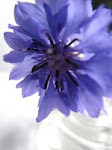I'm not at all sure how to proceed with this review. I loved Betsy Whyte's "The Yellow on the Broom," about a nomadic group of people known as "Scottish Travellers" (British spelling). Scottish Highland Travellers were the subject of a post I wrote a short time ago on my regular (not book) blog, Celtic Lady.
The trouble is, I reviewed a book on the same subject just a few weeks ago. My research into the Scottish Highland Travellers, or Tinkers, as they are pejoratively called, led me to buy both Betsy's book and "Jessie's Journey: Autobiography of a Traveller Girl" by Jess Smith at the same time. In reviewing "Jessie's Journey", I gave background information on the travellers and addressed the terrible discrimination that has been directed against them.
There are differences between the two books, of course. Jessie (maiden name Riley) traveled with her parents and her seven sisters in an old blue bus in the 1960s. Betsy's story takes place in an earlier era - the 1930s. She and her family (the Townsleys) traveled in the more traditional way, with a pony and cart. They slept in bow tents formed by fabric draped over bent willow sticks.
Even though they had the reputation of being dirty, lazy, thieving Gypsies, Betsy's family, like Jessie's, were honest people who worked for their living. They picked berries, worked on farms and made willow and wire baskets for sale. Whyte's father was also a pearl fisherman.
Betsy would often go with her mother, Maggie, as they bartered or asked for food, or for rags to sell. Maggie sometimes did a bit of fortune telling as well, for she had The Gift of second sight. In the book we see signs that Betsy too, had The Gift.
Like most traveller families, Betsy's was very close knit and they met up with their kinsmen on the road as often as possible. For relaxation in the evenings, they played and sang old Scottish tunes carried along through the centuries by oral tradition. One of my favorite chapters in the book is when Betsy and her dad are invited to play their pipes at the farm home of Cameron Cameron, son of a Scottish laird. Cameron was a bit mad, convinced that Bonnie Prince Charlie could still be found roaming the local glen, but he and his family were very kind to the Townsleys and they returned to work at the farm for several seasons.
Another name for travellers was The Summer People. Although traveller children were required to attend 200 half days of school, Betsy's family would try to get on the road as early as possible in the spring. When Maggie complained about having to live in a house in the winter ("that dirty wee dark hole"), Betsy's father would say, "Never mind, Maggie. I'll take you away when the yellow's on the broom." (Broom is a shrub that was covered in profuse golden-yellow flowers in the spring.)
One spring the family stayed extra long in town because the headmaster had convinced them that Betsy, an excellent student, deserved to take her qualifying exams for secondary school. She took them and won a bursary (scholarship). But bright as she was, Betsy hated school because of the bullying she received from the other students. One one especially sad occasion, she was accused of stealing. A10-pound note had been planted in her coat pocket, but Betsy knew she could not convince anyone of her innocence, so the family fled town in the middle of the night.
Betsy is an excellent storyteller and I thoroughly enjoyed her descriptions of traveller life and her use of cant, the secret traveller language. While many of Betsy's stories paralleled Jessie's accounts, Betsy addresses a couple of subjects that were either only touched on or not mentioned in "Jessie's Journey." In doing research on the travellers I had learned that they were deathly afraid of doctors and hospitals, because they believed they could be snatched up and murdered so their bodies could be used in anatomy schools. This seemed rather far fetched to me when I read it, but Betsy describes that very fear.
I was especially moved by Betsy's recounting of the many ways travellers expressed their generosity. Having little and wanting little, their greatest pleasure in life was giving. She also lauded the country people for being good to the travellers. "There were hundreds of travellers who would never have survived but for the generous goodness of the warm-hearted Scottish people." This went on, she writes, up until the time the Welfare State came into being.
For as much as the travellers had previously experienced cruelty, intolerance, injustice and prejudice, life was in many ways wonderful for them as they enjoyed the beauty of nature and the freedom of the road. The government made their lives worse, says Betsy. "This Welfare State - which was meant to help people - brought much suffering, confusion, and unhappiness to the travelers." Travellers especially hated being told what to do. The government forced them to live in houses, like caged birds. Although they were given jobs, they hated being tied down to a monotonous routine. "It was not laziness", writes Betsy. "Most travellers are good workers. It was the compulsion that irked them."
After I wrote about the tinkers and travellers in my regular blog, I was contacted by Patsy Whyte, Betsy's great niece. Patsy has an even more terrible story to tell: she lived all of the horrors of the Welfare State and very few if any of the delights of the vanishing traveller way of life. I hope to obtain a copy of her book, "No Easy Road."






No comments:
Post a Comment